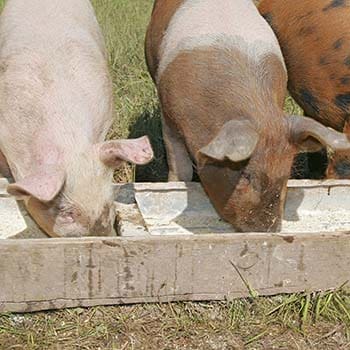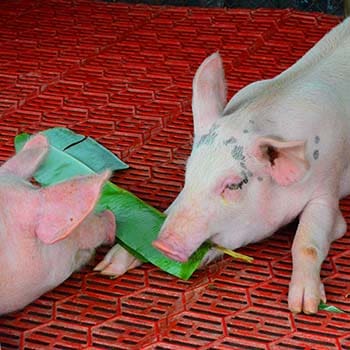Pigs have been unfairly labeled as unclean animals who eat anything. But that couldn’t be further from the truth. Pigs are actually extremely clean, they might look dirty because they roll around in the mud, but they engage in this practice because they don’t have sweat glands, and the mud keeps them cool.
There goes the myth associated with the term, ‘sweating like a pig.’ Additionally, while wild pigs eat whatever is edible to them, domesticated pigs require a low-fiber, high-protein diet. Furthermore, there are many foods you should never feed your pigs, here are ten of them.
#1 Raw Meat
Pigs in the wild are known to kill and feast on the raw meat of their prey. However, eating raw meat is not healthy for domesticated pigs because it can make them vulnerable to various infections and diseases. These infections and diseases can also have a negative effect on the humans that eat pigs due to the parasites that can be transmitted through the meat. Cook meat thoroughly before feeding it to your pigs.
#2 Raw Eggs
Raw eggs are bad for domesticated pigs because they interfere with biotin absorption. Biotin is a water-soluble B vitamin required for the healthy development of pigs. Symptoms of biotin deficiency in pigs include scaly skin, hair loss, poor growth, lameness, and claw defects. If you are going to feed your pigs eggs, make sure it is properly cooked.
#3 Onions
There is an ongoing debate as to whether pigs can eat onions. Some experts say they are poisonous for pigs, while others say they can be consumed in small amounts. Nevertheless, too many onions can cause diarrhea, bad gas, and indigestion. While these conditions are not fatal, they are very uncomfortable for pigs.
But one of the main problems with onions is they contain thiosulfate, a compound that can cause poisoning when consumed in high quantities. Symptoms of thiosulfate poisoning include anemia and compromised blood clotting. While these symptoms won’t cause immediate death, they can be fatal if the pig is already sick or injured.
Furthermore, thiosulfate breaks down very slowly, which means it takes a while for it to leave the pig’s body. If the compound accumulates, your pigs will suffer, which is why it’s best not to feed pigs onions at all. And finally, when pigs that eat a lot of onions are ready for slaughter, the meat ends up tasting sulfurous, which is not very nice.
#4 Moldy Food
Rotten food can cause mycotoxin poisoning in pigs. Symptoms of mycotoxin poisoning include visible stress, lethargy, foaming at the mouth, vomiting, increased skin sensitivity, reproductive issues, and a suppressed immune system. Sometimes, mold is not visible on food; therefore, it’s important to take precautions with pig food by doing the following:
- Keep storage areas for food, hay, and grain clean, dry, and cool
- Protect food storage areas from rats, mice, and other wildlife because they can chew holes in food bags which will expose the food to damp conditions
- Label food with the date, and feed that first so you are getting rid of old food before it expires
#5 Cherry Pits
Pigs can eat the flesh from a cherry but they can’t eat the pits. The seeds contain a compound called amygdalin. When eaten, it converts into a toxic chemical called hydrogen cyanide. Symptoms of hydrogen cyanide poisoning include vomiting and spasms, and the pig will usually go into a coma before it dies.
#6 Parsley/Parsnips/Celery
These vegetables and herbs contain many healthy vitamins and nutrients for humans. But they also contain a chemical called furocoumarins which can cause skin sensitivities in pigs and increase their chances of getting sunburn.
#7 Junk Food
Fast food, cookies, chips, and processed foods in general are high in sugars, salts, fats, and other unhealthy additives and preservatives that can cause obesity and other health problems in pigs.
#8 Avocado
Avocados are full of healthy vitamins and minerals beneficial for humans. But the fruit contains persin which is a deadly toxin for pigs.
#9 Green Potato
Green potatoes contain a toxin called solanine which can be deadly for pigs. Therefore, make sure your pigs have no access to green potatoes. However, there is nothing wrong with feeding them ripe potatoes.
#10 Toxic Plants
Several plants are toxic to pigs; eating them can cause severe health problems and in some cases, the consequences of consuming these plants are fatal. Here are a few plants to keep away from your pigs:
- Acorns and Oak Leaves: Tannins are a chemical present in oak leaves and acorns. When consumed in excess, tannins can lead to digestive problems and damage the kidneys.
- Nightshade Species: Some species of the nightshade family such as black nightshade and deadly nightshade are especially toxic for pigs.
- Poison Hemlock: This plant is extremely toxic, if eaten, it can cause paralysis and death.
- Bracken Fern: For pigs, eating bracken fern can cause thiamine deficiency which can kill them if the condition is not treated properly.
- Foxglove: Pigs rarely eat foxglove because it has such an obnoxious taste. But on the odd occasion they do eat it, there’s a high chance the plant will kill them. Early signs of poisoning include vomiting, diarrhea, drooling, no appetite, and lethargy. Eventually, the pig will fall into a coma and die.
- Angel Trumpet: This plant contains tropane alkaloids which can be toxic to pigs. Angel trumpet poisoning symptoms include seizures, tremors, disorientation, and vomiting.
If you are planning on getting pigs for your homestead, do plenty of research about the foods they can’t eat because there is so much more to learn. It’s especially important to do some research surrounding toxic plants before the pigs arrive. Because unbeknownst to you, you could have several toxic plants lurking in your garden at the moment.
Additionally, do some reading about the foods that are best for them because ultimately, what you want is to have healthy, happy pigs.
Finally, if you suspect your pigs are suffering from food poisoning from eating any of the foods mentioned, seek veterinary attention immediately.
You may also like:
How The Pioneers Could Predict The Weather
The Succulent Red Plant That Tastes Like Bacon (Video)
In 10 Years You Wish You’d Known This
Livestock In Winter: Mistakes Even The Most Advanced Homesteaders Make












Interesting that you say not to feed acorns nor oak leaves. In my area, both are plentiful, and local breeders raise their best pigs during mast years (times when there is an abundance of acorns).
From which source did you get your information?
I ‘m also confused about it….